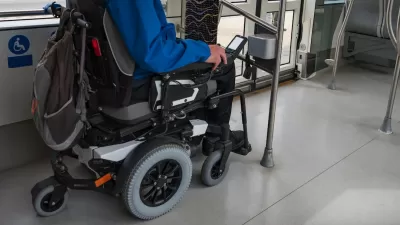The Justice Department has put local governments with “crime-free” and “nuisance” housing programs on notice that implementation may be unlawful when it unfairly penalizes classes of people protected under federal law.

The Justice Department has issued a letter of warning to state and local police and governments about widespread “crime-free” and “nuisance” programs, which may violate federal housing protections, reports Oklahoma’s News 4 (KFOR). According to the ACLU, “crime free housing” or “nuisance property” ordinances penalize landlords and tenants based on police or other emergency services response at a rental property, even if the tenant was the victim of a crime or medical emergency. Proponents say they are intended to prevent crime, drugs, and gangs on rental properties, but critics say they are disproportionately enforced against BIPOC and force tenants to choose between keeping their home and calling the police or emergency services for help.
“Justice officials are requesting caution in implementation as they may be unlawful when they unfairly penalize communities of color, individuals with disabilities or survivors of domestic abuse,” writes KFOR reporter Terré Gables writes. The letter also said that, “while the objective of these programs may be to reduce crime, there is no evidence to support that they accomplish that goal.”
Examples of programs cited in the letter that affect housing rights and raise question under federal law include programs that
- restrict housing based on criminal records or arrest records;
- don’t provide case-by-case determination of safety concerns;
- impose negative housing consequences on an entire household;
- provide substantial encouragement discretion that may be used to target people protected under federal law;
- were adopted with discriminatory intent (e.g., in reaction to growing diversity or racial tension)
- threaten or impose penalties for calls for disability-related issues
- publicize confidential information about an individual’s disabilities
- fail to reasonably accommodate modifications to avoid disability-related discrimination.
Under federal fair housing laws, it is illegal to harass or deny housing to people because of race, color, religion, national origin, sex, disability, and familial status. Additional protections are provided to people with disabilities under the American with Disabilities Act.
FULL STORY: DOJ releases letter addressing Housing Programs that violate Federal Law

Trump Administration Could Effectively End Housing Voucher Program
Federal officials are eyeing major cuts to the Section 8 program that helps millions of low-income households pay rent.

Planetizen Federal Action Tracker
A weekly monitor of how Trump’s orders and actions are impacting planners and planning in America.

Ken Jennings Launches Transit Web Series
The Jeopardy champ wants you to ride public transit.

California Invests Additional $5M in Electric School Buses
The state wants to electrify all of its school bus fleets by 2035.

Austin Launches $2M Homelessness Prevention Fund
A new grant program from the city’s Homeless Strategy Office will fund rental assistance and supportive services.

Alabama School Forestry Initiative Brings Trees to Schoolyards
Trees can improve physical and mental health for students and commnity members.
Urban Design for Planners 1: Software Tools
This six-course series explores essential urban design concepts using open source software and equips planners with the tools they need to participate fully in the urban design process.
Planning for Universal Design
Learn the tools for implementing Universal Design in planning regulations.
Ada County Highway District
Clanton & Associates, Inc.
Jessamine County Fiscal Court
Institute for Housing and Urban Development Studies (IHS)
City of Grandview
Harvard GSD Executive Education
Toledo-Lucas County Plan Commissions
Salt Lake City
NYU Wagner Graduate School of Public Service





























